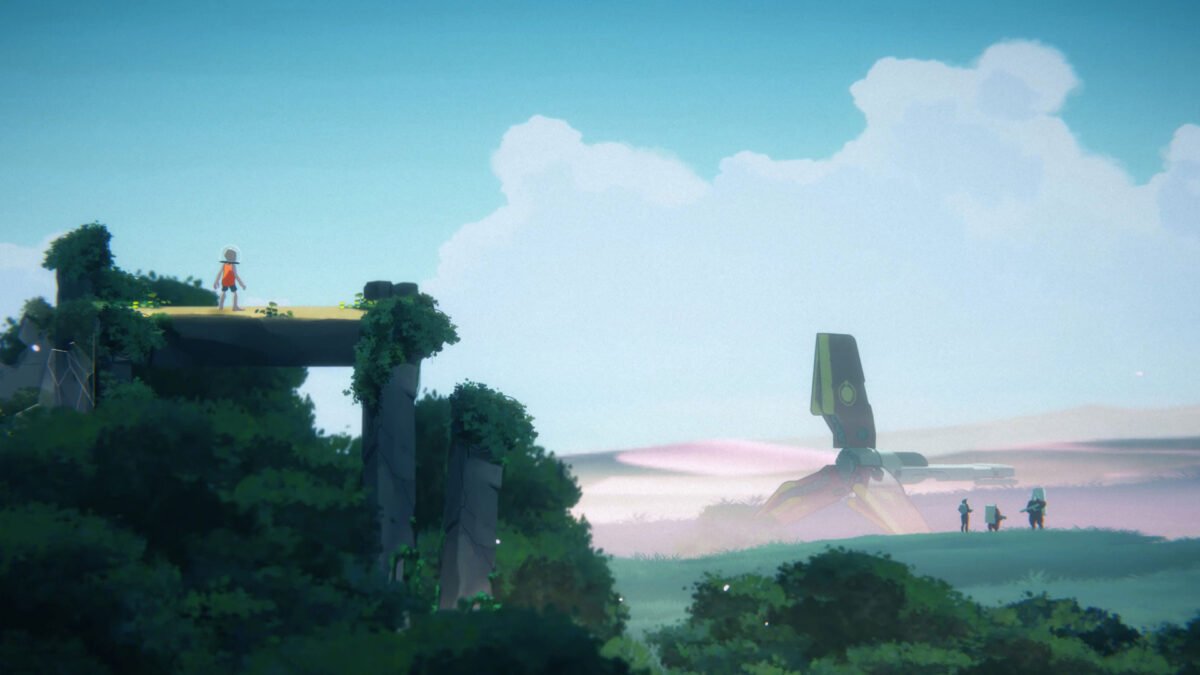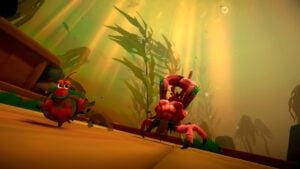The Cub naturally intrigued me based on its obvious parallels to Limbo and Inside. While obviously, Playdead’s iconic games weren’t the first to create 2D puzzle platformers in oppressive worlds, they definitely popularized them in the modern day—personally, I played Limbo way before I knew Oddworld: Abe’s Odyssey was even a thing.
In this regard, I’m interested in any game that can capture the similar vibes and atmosphere of those aforementioned games and sometimes wonder why there aren’t more notable examples in the genre. However, The Cub certainly answered this question—because this kind of game is a very particular type of mélange and if one ingredient is off, the whole thing falls apart.
Set in the same universe as Golf Club Nostalgia and Netflix’s Highwater show and game, The Cub tells the story of a mutant boy living on Earth after it had been abandoned by humans due to an apocalyptic event. One day, while the Cub was just living life and vibin’ a bunch of humans came down from the now-colonized Mars, only to see him and try to capture him. Naturally, shenanigans ensue.
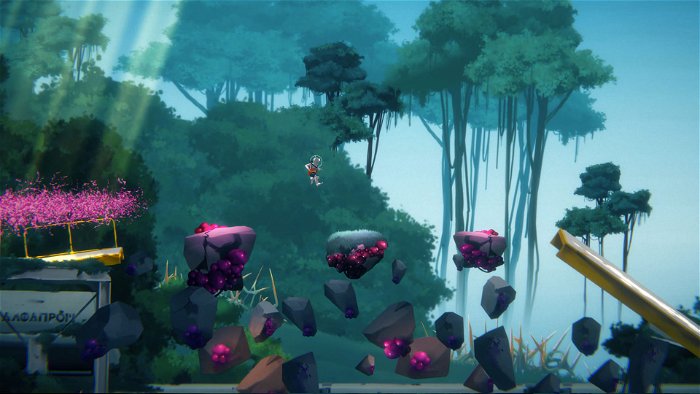
There really isn’t much in the way of plot, both over-arching or in the moment-to-moment narrative but the lack of plot is actually worsened by the way the game tries to tell its story. Unlike most games of this ilk that deliver most of its narrative through background details and player interpretation, The Cub has almost no atmosphere saving all its storytelling to text logs that can be found and end-chapter cutscenes where the Cub explains not only what just happened, but what’s about to happen next.
Not only does this kill a lot of the game’s technical pacing—actively forcing the player to stop and explore rather than taking in little details while still maintaining the flow of the game—but, destroys the game’s narrative pacing as well, never allowing anything to happen organically and needing to lay out in advance. Also, as I’ve complained about in the past, I’ve always felt that this kind of storytelling insults the player’s intelligence, in fear that they might miss any of the obviously scripted moments, and feeling the need to explain everything.
“…For a world that’s supposed to have been flooded, there really isn’t that much water or anything particularly mutated and strange…”
What’s infuriating is this game could have somewhat achieved what it wanted through the implementation of the in-game radio station that is almost constantly playing throughout the Cub’s adventure. Through a dead Martian’s helmet, the Cub listens to Radio Nostalgia, which mostly provides the game’s soundtrack, however, it does small asides in the forms of DJ monologuing, in-universe commercials, and small stories from Martian residents. It becomes so part of the experience that the moment when the Cub’s helmet is shattered and the game reverts to silence and ambiance, it’s truly jarring.
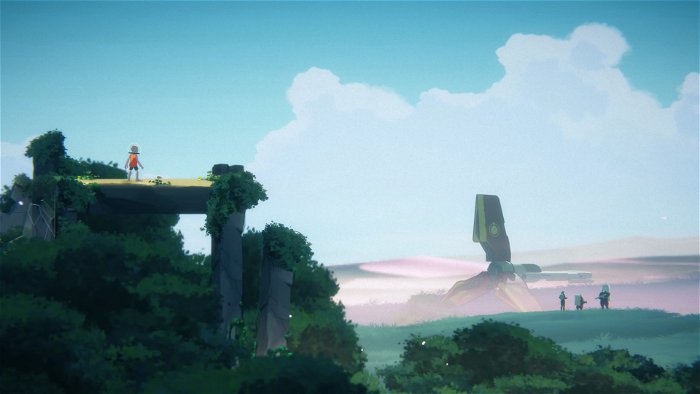
This could have been the emotional and narrative anchor for the entire game’s experience, and it’s completely squandered for ham-fisted in-game moments, or needless over-explanation that actively subtracts from any feelings the game could otherwise elicit.
Not that The Cub has anything to say both in its obvious narrative or in its subtle themes. For a game that has so much supposed lore behind it—needing both two games and a Netflix series to encompass the entire thing—it doesn’t do anything with both its settings or, as the Steam page for Golf Club Paradise describes it, “poignant” commentary.
For starters, for a world that’s supposed to have been flooded, there really isn’t that much water or anything particularly mutated and strange. Aside from one giant hedgehog creature that can shoot quills, the rest is just giant animals, and a few background deer with glowing antlers. Furthermore, even the humans who show up to capture the Cub aren’t really given anything in the way of pathos and are dispatched by the Cub either cartoonishly or pathetically easily.
You could see how in a game that actually told its story through its gameplay and atmosphere, this could have easily been achieved through the perception of a child, as relentless humans are trying to hunt it for reasons it can’t understand. Instead, the game beats you over the head with how pleased the CEO will be if they capture the child—with even the Cub explaining this plot point at one moment.
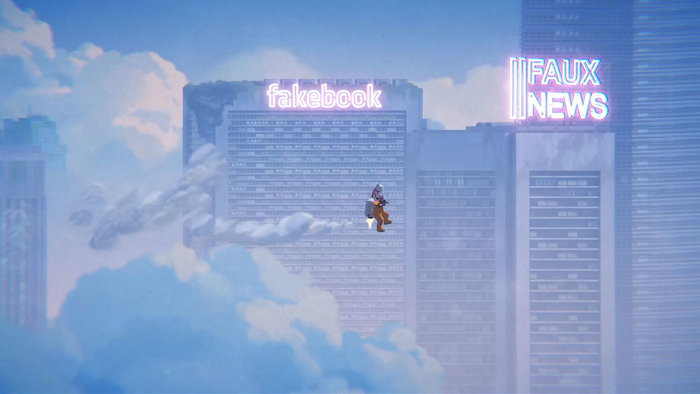
And for a game that is supposedly trying to hold up a mirror to the dark condition of capitalistic society, all it can seem to muster in the way of commentary are “poignant” jabs taken by the game like a building with a “Falsebook” sign or text-logs referring to an amorphous social media program called “DigiDopamine.” Take that society.
“The Cub has all of three challenges, that it repeats throughout the game, in the same order then you win. It’s about as bog-standard as they come.”
The Cub suffers in the gameplay department. In games like Limbo, Inside or Little Nightmares there’s a very clear sense of weight and movement as the character jumps, climbs and stumbles around the environment. But not only is The Cub’s platforming incredibly rudimentary but there’s a choppiness to the Cub’s movement animations that completely kills any sense of fluidity you need in a game that touts itself as “post-apocalyptic parkour.”
Furthermore, the Cub always feels somewhat sluggish to control, with his momentum swinging wildly from moment to moment which can make the game incredibly unpredictable when it comes to avoiding hazards and pitfalls. Sometimes your momentum will drop out completely, other times it will throw you clean past platforms. There was one particularly frustrating moment when the Cub needed to avoid trip-mine net traps where it seemed like no matter how you jumped, you would get caught. Another where you needed to swing on poles and the Cub just would not grab the second pole until I guess he suddenly felt like it.
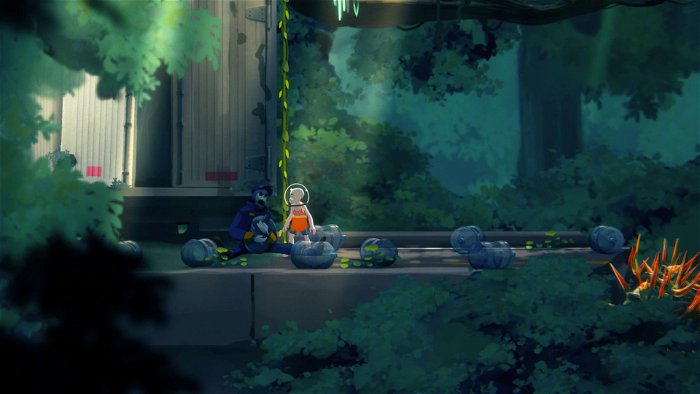
The worst part about it is The Cub never really feels fun or tense to play in. Games like Limbo or Inside usually introduce hazards and slowly build upon them until the next one, allowing players to come to grips with what’s going on, and introducing progressive challenges. This makes the game incredibly satisfying when you outrun a big opponent or solve a particular puzzle. The Cub has all of three challenges, that it repeats throughout the game, in the same order then you win. It’s about as bog-standard as they come.
“The radio could have done so much to make the world feel lived in and authentic had the gameplay matched its tone, but it just doesn’t…”
I guess, in a sense, the Steam page for The Cub is accurate in saying it’s “ inspired by classic SEGA games of the 90s,” because the the animation and platforming sure feel like they’re out of a Genesis game in the worst possible way.
In the audio/visual department, The Cub is nothing special. Its world, while coloured beautifully is somewhat boring and lacklustre. If you’ve seen one post-apocalyptic urban landscape overgrown with flora, you’ve seen them all. The aforementioned lack of anything particularly mutant does a lot to make the world feel pretty uninteresting as well, and the choppy animations just make the whole thing feel amateurish.
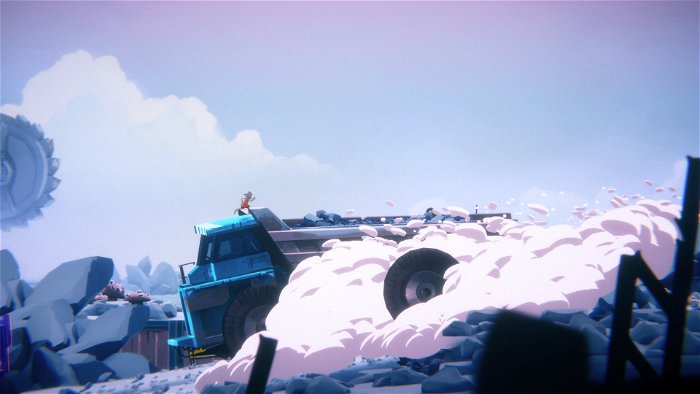
Like I said, the only place where the game does stand out—albeit to unrealized effect—is the in-game radio. The individual tracks that play during the Cub’s Odyssey could have added a lot to the moment-to-moment gameplay with tracks ranging from fast-paced jazz, to punk rock, to melancholic trance. The radio could have done so much to make the world feel lived in and authentic had the gameplay matched its tone, but it just doesn’t.
The Cub could have been an excellent game, one to rival Limbo or Inside. The pieces were all there for a child in a lonely and foreboding atmosphere, highlighted by chases from hostile and aggressive adults. Its “commentary” could’ve been poignant if the effects of capitalism were actually shown in the game—or manifested as true threats to player progression. Instead, The Cub ends up feeling like a cheap knock-off of better games, one that I can’t see anyone but hardcore Highwater fans getting into.
